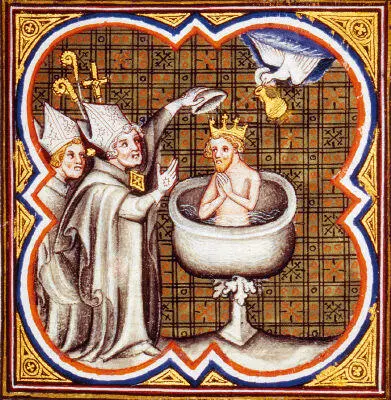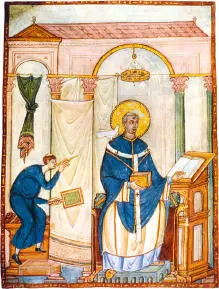
The Holy Spirit, in the guise of a dove, delivers an ampulla full of sacred oil for the baptism of King Clovis, founder of the Frankish kingdom (illustration from the Grandes Chroniques de France , c .1380). According to the founding myth of France, this ampulla was henceforth kept in Rheims Cathedral, and all subsequent French kings were anointed with the divine oil at their coronation. Each coronation thus involved a miracle, as the empty ampulla spontaneously refilled with oil. This indicated that God himself chose the king and gave him His blessing. If God did not want Louis IX or Louis XIV or Louis XVI to be king, the ampulla would not have refilled.
© Bibliothèque nationale de France, RC-A-02764, Grandes Chroniques de France de Charles V, folio 12v.
What’s true of ethics and politics is also true of aesthetics. In the Middle Ages art was governed by objective yardsticks. The standards of beauty did not reflect human fads. Rather, human tastes were supposed to conform to superhuman dictates. This made perfect sense in a period when people believed that art was inspired by superhuman forces rather than by human feelings. The hands of painters, poets, composers and architects were supposedly moved by muses, angels and the Holy Spirit. Many a time when a composer penned a beautiful hymn, no credit was given to the composer, for the same reason it was not given to the pen. The pen was held and directed by human fingers which in turn were held and directed by the hand of God.
Medieval scholars held on to a classical Greek theory, according to which the movements of the stars across the sky create heavenly music that permeates the entire universe. Humans enjoy physical and mental health when the inner movements of their body and soul are in harmony with the heavenly music created by the stars. Human music should therefore echo the divine melody of the cosmos, rather than reflect the ideas and caprices of flesh-and-blood composers. The most beautiful hymns, songs and tunes were usually attributed not to the genius of some human artist but to divine inspiration.

Pope Gregory the Great composes the eponymous Gregorian chants. The Holy Spirit, in its favourite dove costume, sits on his right shoulder, whispering the chants in his ear. The Holy Spirit is the chants’ true author, whereas Gregory is just a conduit. God is the ultimate source of art and beauty.
Manuscript: Registrum Gregorii , c. 983 © Archiv Gerstenberg/ullstein bild via Getty Images.
Such views are no longer in vogue. Today humanists believe that the only source for artistic creation and aesthetic value is human feelings. Music is created and judged by our inner voice, which need follow neither the rhythms of the stars nor the commands of muses and angels. For the stars are mute, while muses and angels exist only in our own imagination. Modern artists seek to get in touch with themselves and their feelings, rather than with God. No wonder then that when we come to evaluate art, we no longer believe in any objective yardsticks. Instead, we again turn to our subjective feelings. In ethics, the humanist motto is ‘if it feels good – do it’. In politics, humanism instructs us that ‘the voter knows best’. In aesthetics, humanism says that ‘beauty is in the eye of the beholder’.
The very definition of art is consequently up for grabs. In 1917 Marcel Duchamp took an ordinary mass-produced urinal, named it Fountain , signed his name at the bottom, declared it a work of art and placed it in a Paris museum. Medieval people would not have bothered to even argue about it. Why waste oxygen on such utter nonsense? Yet in the modern humanist world, Duchamp’s work is considered an important artistic milestone. In countless classrooms across the world, first-year art students are shown an image of Duchamp’s Fountain , and at a sign from the teacher, all hell breaks loose. It is art! No it isn’t! Yes it is! No way! After letting the students release some steam, the teacher focuses the discussion by asking ‘What exactly is art? And how do we determine whether something is a work of art or not?’ After a few more minutes of back and forth, the teacher steers the class in the right direction: ‘Art is anything people think is art, and beauty is in the eye of the beholder.’ If people think that a urinal is a beautiful work of art – then it is. What higher authority is there that can tell people they are wrong? Today, copies of Duchamp’s masterpiece are presented in some of the most important museums in the world, including the San Francisco Museum of Modern Art, the National Gallery of Canada, the Tate Gallery in London and the Pompidou Centre in Paris. (The copies are placed in the museums’ showrooms, not in the lavatories.)
Such humanist approaches have had a deep impact on the economic field as well. In the Middle Ages, guilds controlled the production process, leaving little room for the initiative or taste of individual artisans and customers. The carpenters’ guild determined what was a good chair, the bakers’ guild defined good bread, and the Meistersinger guild decided which songs were first class and which were rubbish. Meanwhile princes and city councils regulated salaries and prices, occasionally forcing people to buy fixed amounts of goods at a non-negotiable price. In the modern free market, all these guilds, councils and princes have been superseded by a new supreme authority – the free will of the customer.
Suppose Toyota decides to produce the perfect car. It sets up a committee of experts from various fields: it hires the best engineers and designers, brings together the finest physicists and economists, and even consults with several sociologists and psychologists. To be on the safe side, they throw in a Nobel laureate or two, an Oscar-winning actress and some world-famous artists. After five years of research and development, they unveil the perfect car. Millions of vehicles are produced, and shipped to car agencies across the world. Yet nobody buys the car. Does it mean that the customers are making a mistake, and that they don’t know what’s good for them? No. In a free market, the customer is always right. If customers don’t want it, it means that it is not a good car. It doesn’t matter if all the university professors and all the priests and mullahs cry out from every pulpit that this is a wonderful car – if the customers reject it, it is a bad car. Nobody has the authority to tell customers that they are wrong, and heaven forbid that a government would try to force citizens to buy a particular car against their will.
What’s true of cars is true of all other products. Listen, for example, to Professor Leif Andersson from the University of Uppsala. He specialises in the genetic enhancement of farm animals, in order to create faster-growing pigs, dairy cows that produce more milk, and chickens with extra meat on their bones. In an interview for the newspaper Haaretz , reporter Naomi Darom confronted Andersson with the fact that such genetic manipulations might cause much suffering to the animals. Already today ‘enhanced’ dairy cows have such heavy udders that they can barely walk, while ‘upgraded’ chickens cannot even stand up. Professor Andersson had a firm answer: ‘Everything comes back to the individual customer and to the question how much the customer is willing to pay for meat ... we must remember that it would be impossible to maintain current levels of global meat consumption without the [enhanced] modern chicken ... if customers ask us only for the cheapest meat possible – that’s what the customers will get ... Customers need to decide what is most important to them – price, or something else.’ 3
Читать дальше
Конец ознакомительного отрывка
Купить книгу














